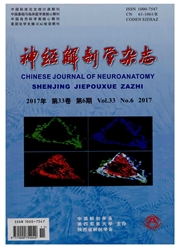

 中文摘要:
中文摘要:
本实验旨在建立可用于中枢神经系统Waller变性研究的大鼠视神经(ON)损伤模型。成年SD大鼠12只。用夹持力为148g、镊端宽1mm的小号动脉阻血镊于球后2mm处夹持左侧视神经,致伤时间10s。术后随机分为两组(每组6只):一组动物术后立即于双侧上丘表面放置逆行荧光染料荧光金(FG),72h后处死。取视网膜铺片,ON冰冻连续切片。另一组动物术后72h常规灌注固定,取ON冰冻连续切片,分别行β-tubulin及NF-160免疫组化染色和HE染色。结果显示:左侧ON夹伤后3d,同侧视网膜内未见FG逆行标记的视网膜神经节细胞,ON夹伤部位形成一条宽达1mm的损伤带,ON基质连续,FG标记的神经纤维被阻断于损伤远侧,损伤远侧的β-tublin阳性纤维多已崩溃,NF-160阳性纤维数量较多,部分纤维末梢形成膨大的回缩球。上述结果表明ON夹伤后神经元轴突完全离断,中枢神经基质的连续性得以保持,损伤远侧段轴突发生典型的Waller变性,从而为中枢神经Waller变性及其药物治疗研究的筛选和评估提供了简单实用的实验模型。
 英文摘要:
英文摘要:
To establish a new rat optic nerve model suitable for investigating Wallerian degeneration in the central nervous system ( CNS), a pair of forceps with a width of 1 mm and clipping pressure of 148 g was used to crush the exposed left optic nerves (ON) of 12 adult female SD rats for 10 s at 2 mm from the optic disc. The animals were randomly divided into 2 groups ( n =6 for each group) after surgery. Six animals received administration of retrograde fluorescent dye, FluroGold ( FG), onto the bilateral superior colliculi immediately after ON crush, and survived for 72 h. The retinas were removed for flat-mount and ON were cut for cryostat serial sections after these animals were killed. The other 6 animals were perfused 72 h after ON crush and the ON were cryo-sectioned for β-tubulin and NF-160 immunostaining and HE histological staining, respectively. The results showed that three days after the left ON crush, no FG-labeled retinal ganglion cells were detected in the left retina. A lesion zone of 1 mm width appeared within the crushed ON, and the continuity of the ON ma- trix was maintained. Most FG-labeled and NF-160 immunopositive axons were interrupted within the distal segment of the crushed ON where most β-tubulin immunopositive structures were destroyed. The present results indicate that the crushed axons are totally separated after ON crush but with maintained continuity of the ON matrix, and classic Wallerian degeneration take place in the distal segment of crushed ON. Thus, we have established a simple and pragmatic rat model for the study of Wallerian degeneration in the CNS and its treatment.
 同期刊论文项目
同期刊论文项目
 同项目期刊论文
同项目期刊论文
 期刊信息
期刊信息
